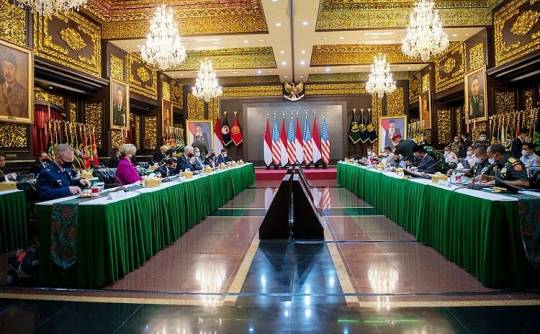#defenseintegration
Text
Indo-Pacific Defense Collaboration Endorsed

The United States has taken a significant step in strengthening its defense relationships in the Indo-Pacific region. Following extensive consultations with allies and partners, a Statement of Principles for Indo-Pacific Defense Industrial Base Collaboration was endorsed, aiming to enhance security and stability.
Introduction
In a landmark move, the U.S. and its allies endorsed a Statement of Principles for Indo-Pacific Defense Industrial Base Collaboration. This endorsement, announced at the 2024 Shangri-La Dialogue in Singapore, aims to strengthen defense industrial resilience and enhance regional security through collaborative efforts.
Background and Context
The endorsement comes after comprehensive discussions with U.S. allies and partners across the Indo-Pacific, including the Maluhia Talks in Honolulu, Hawaii. Secretary of Defense Lloyd J. Austin III highlighted this initiative during his speech at the 2024 Shangri-La Dialogue in Singapore, emphasizing the importance of breaking down national barriers and integrating defense industries to fortify shared capacity.
Key Principles of the Statement
The Statement of Principles outlines several core objectives to guide collaborative actions among participating nations. These principles include:
- Enhancing Industrial Resilience: Ensuring the shared defense industrial resilience is crucial for regional security, economic stability, and prosperity.
- Expanding Capabilities: Strengthening defense industrial resilience requires expanding industrial base capability, capacity, and workforce.
- Increasing Supply Chain Resilience: Promoting supply chain resilience to mitigate potential vulnerabilities and facilitate cooperation.
- Promoting Defense Innovation: Encouraging defense innovation and improving information sharing among allies.
- Standardization and Cooperation: Facilitating standardization, reducing barriers to cooperation, and optimizing collaboration by considering the needs and capabilities of participants.
Collaborative Actions and Future Dialogue
The principles emphasize that collaborative actions will involve not only governments but also industry, academia, and other partners. This inclusive approach aims to leverage diverse resources and expertise to achieve shared goals.
Key Principles for Defense Industrial Collaboration
Principle
Objective
Industrial Resilience
Ensure regional security and economic stability
Capability and Capacity Expansion
Strengthen industrial base capability and workforce
Supply Chain Resilience
Promote resilience to mitigate vulnerabilities
Defense Innovation
Encourage innovation and improve information sharing
Standardization and Cooperation
Facilitate standardization and reduce cooperation barriers
Impact of the Statement
The adoption of this statement is expected to have far-reaching implications for regional security and defense cooperation. By fostering collaboration, the participating nations aim to build a more resilient and integrated defense industrial base that can respond to emerging challenges more effectively.
Recent Developments
This initiative follows the January 2024 release of the Department of Defense's National Defense Industrial Strategy (NDIS), which identified the expansion of global defense production as a key effort towards advancing resilient supply chains. The NDIS emphasizes the need for multilateral and bilateral agreements to boost defense production, innovation, and overall capability.
Conclusion
The endorsement of the Statement of Principles for Indo-Pacific Defense Industrial Base Collaboration marks a pivotal moment in regional defense cooperation. By committing to these principles, the U.S. and its allies are poised to enhance their defense industrial resilience, ensuring greater security and stability in the Indo-Pacific region and beyond.
Call to Action
For more insights into how these collaborative efforts are shaping global defense strategies, follow THX News for the latest updates and expert analysis on defense and security matters.
Sources: THX News & US Department of Defense.
Read the full article
#collaborativedefenseactions#Defenseindustrialbase#defenseindustry#defenseinnovation#defenseintegration#defensepartnerships#defenseproduction#Regionalsecurity#Securitycooperation#thxnews
0 notes